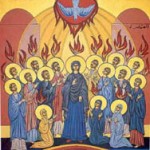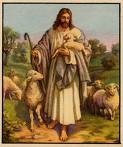Pentecost sermon Acts 2:1-21
Â
Stop in silence for a while.
“Where do you fit into the story of Pentecost?”
Acts 2:38-39 gives the answer to that question. ‘Peter replied, “Repent and be baptized, every one of you, in the name of Jesus Christ for the forgiveness of your sins. And you will receive the gift of the Holy Spirit. The promise is for you and your children and for all who are far off– for all whom the Lord our God will call.”
You are people of the promise of God. You are the ones Peter, moved by the power of the Spirit, foretold would come to faith in Jesus. You, me, my children, your children, WE and part of the Pentecost story.
 The tongues of fire were a visible manifestation of the Spirit of God, bringing faith and power in the promise of God. Baptism, the water connected with the word is a visible manifestation of the Spirit of God. It brings the promised grace of God foretold by the prophets long ago ‘In the last days, God says, I will pour out my Spirit on all people.’ You and I are the people of Pentecost, the truth of the promise; the fulfillment of the prophesy ‘the gift of the Holy Spirit…is for all who are far off– for all whom the Lord our God will call.”Â
Holy Baptism is a foundational moment when the gospel message of forgiveness of sins was spoken to us and the gift of the Holy Spirit washed over our lives for the very first time. For that day on, as it was for the disciples, we are invited to a life of daily repentance and remembrance of our baptism; this is to live in the Spirit of God. We are invited to a daily renewal of trust in the forgiving promise and the gift of the Spirit offered to us in this sacrament instituted by Jesus Christ. We are invited by Jesus to receive the gift of the Holy Spirit each and every day.Â
Peter gives this promise ‘Whoever calls upon the name of the Lord shall be saved’. This invitation to salvation which we have touched on briefly is the call to repentance. It is the universal call to all people to turn from their own ways and to turn to God in Jesus Christ, ‘who was delivered over to death for our sins and was raised to life for our justification.’  God offers the Holy Spirit, new life, and forgiveness of sins to all who will receive, yet there are many who have not understood; have not headed the call of the gospel.
Was Pentecost only for pastors and missionaries so only they baptise? The Spirit of power given only to paid church workers to reach all who are far off– for all whom the Lord our God will call.”? We are all baptized, all people of the promise and have the Spirit; we are all part of the spread of the gospel. I have three favorite quotations from theologians of a generation ago (Brooks, Fosdick and Spurgeon), and these three quotations penetrate the heart of Pentecost. The first quotation is this: “Nothing but fire kindles fire.â€Â The second: “If you want to set someone on fire, you have to buuurn a little bit yourself.â€Â The third: “A burning heart will soon find for itself a flaming tongue.â€Â
Â
What happened directly after Pentecost is that those Apostles first went to a village or town, planted a church, and then went to a second village or town, and planted a church. They went to a third village or town and planted another church. They … No! Go back to that first village or town and look more carefully. We have to go back to that first village, because before the Apostles went onto the second village, they left a group of people in that village who were believers  to Jesus Christ. The Greek word is “laos.†They were called the “laosâ€, which means, “the laity,†“the people,â€Â “the people of God.â€Â
The Apostles always left common and ordinary towns people and villagers whose hearts were on fire, whose tongues were on fire, who hadn’t gone to the seminary, who hadn’t seen Jesus face to face, who hadn’t talked with him in the flesh. These were not the Apostles. These were not the twelve disciples. These were the people of God in each village who spread the Gospel from house to house, and neighbor to neighbor and friend to friend and family to family. That’s the way it always is. That fundamental principle is always true; it is the laity, the people of God, who become inspired by the Holy Spirit. They are the ones, not the twelve, not the Apostles, not the pastors. It is the laity, the people of God, who go about proclaiming the good news about Jesus Christ and nurturing those souls into maturity. Â
How do the laity do this? Do they do this by their own enthusiasm? By their own intelligence? By their own seminary training? I kid you not. Do you know why the laity are able to do this? I’ll tell you why. “Nothing but fire…kindles fire.â€Â “If you want to set someone on fire…you have to buuurn a little bit yourself.â€Â “A burning heart will soon find for itself…a flaming tongue.†Â
Amen.

 Â
 

